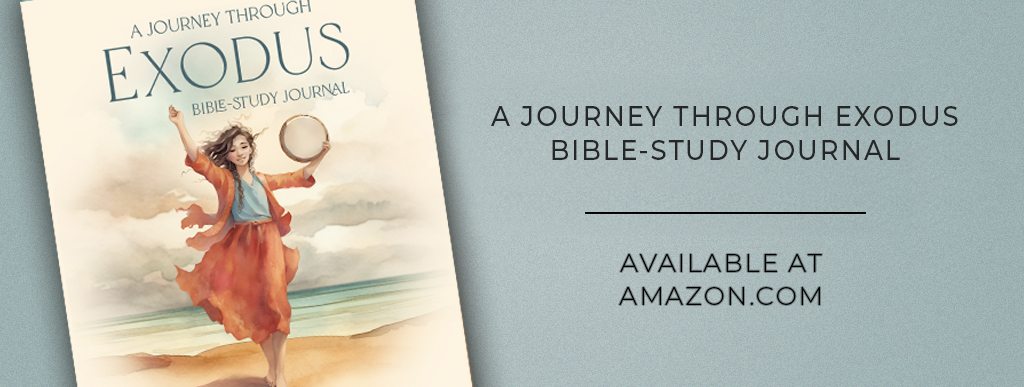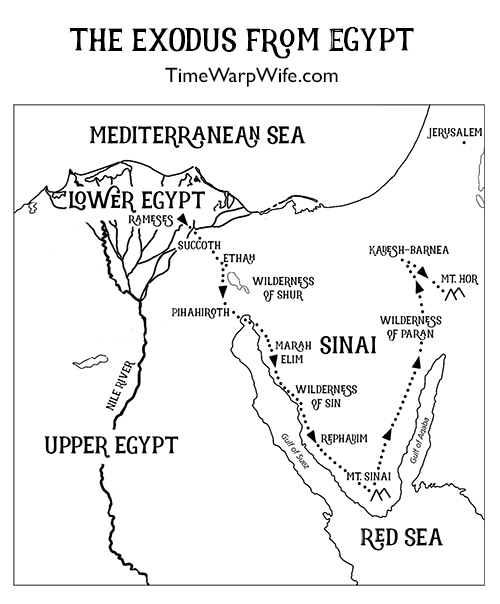Exodus Bible Study – Chapters 1-5
Are you looking for the other posts in this study? Click here for the table of contents.

This Week’s Reading Schedule:
Monday – Exodus 1
Tuesday – Exodus 2
Wednesday – Exodus 3
Thursday – Exodus 4
Friday – Exodus 5

My Thoughts on Exodus Chapters 1-5
We’ve all seen it, The Ten Commandments starring Charlton Heston, it’s fun entertainment. For others, the Biblical account of the Exodus story is a good piece of history–yet it’s far more than that. From the moment you open the book, you begin to unfold a parallel between the Hebrew’s salvation from slavery in Egypt and our salvation through faith Jesus Christ.
As you embark on this journey, keep this parallel in mind–from the Passover experience, through the crossing of the Red Sea, and onto the 40 years in the desert of testing.
As we begin to look at the various plagues that God rained down upon the Egyptians, we start to see that each one of the plagues attacks one or more of the many deities they worshipped. More importantly, perhaps, these plagues attacked the Pharaoh of Egypt who typifies Satan.
A Pharaoh’s role was two-fold, as he was both a religious leader and a civic leader. As a civic leader, he enacted laws, collected taxes, and maintained order. As a religious leader, he was a mediator between the people and the gods they worshipped.
According to Wikipedia (Ancient Egyptian Religion), “Formal religious practice centered on the pharaoh, the ruler of Egypt, who was believed to possess a divine power by virtue of their position. He acted as the intermediary between their people and the gods and was obligated to sustain the gods through rituals and offerings so that they could maintain order in the universe. The state dedicated enormous resources to Egyptian rituals and to the construction of the temples.”
In light of this, we see that these plagues were specifically designed to both prove the authority and supremacy of God and to crush Pharaoh, the symbol of Satan, under His feet.
Exodus Chapter 1
What’s interesting to note in chapter one is that a) the king specifically singles out the male infants, and
b) there is an undeniable parallel between this chapter and Matthew chapter 2.
Calling the midwives, Shiprah and Puah, the king instructs them, “When you are helping the Hebrew women during childbirth on the delivery stool, if you see that the baby is a boy, kill him; but if it is a girl, let her live.”
The midwives feared God and refused to obey the king.
Then Pharaoh gave this order to all his people: “Every Hebrew boy that is born you must throw into the Nile, but let every girl live.”
Looking to Matthew chapter 2, we see King Herod instructing the wise men to report on the location of the Christ child. When they refuse to do so, he’s furious giving the order to kill all of the boys in Bethlehem and its vicinity who were two years old and under, in accordance with the time he had learned from the Magi.
Again we see the king specifically targeting the boys. Why? Both kings were afraid that a king would arise from among the people and overtake their authority.
Exodus Chapter 2
In Exodus chapter 2, we’re introduced to Moses. We see that God protected him, just as He protected Jesus so that His people would be free. Moses was hidden by his parents for three months in Egypt. We see that Mary and Joseph were also sent to Egypt when Christ was born so that the child would be hidden and protected until God gave them the assurance that they would be safe.
“When he arose, he took the young child and his mother by night, and departed into Egypt: and was there until the death of Herod: that it might be fulfilled which was spoken of the Lord by the prophet, saying, Out of Egypt have I called my son.” – Matthew 2:14-15
The Nile river plays a big part in the Exodus story. It was deemed a source of life to the people, and in fact, is also known as “The River of Life.” It’s often regarded as the longest river in the world, while some would argue that the Amazon river holds that title.
While much of Egypt is desert land, the Egyptians were dependent on the river. Each year it flooded its banks providing rich and fertile soil for planting. Their adoration, however, was misplaced. Instead of looking to God as their source of life, they were focused on this earth. So much so, that the Nile had become a god to these people. They worshipped the false god “Hapi” and believed it was because of him the Nile rose each year, flooding its banks.
Throughout scripture, we see God using rivers to illustrate the fact that He is the source of life. Moses was drawn out of the water, Jesus was baptized in the Jordan River, the Garden of Eden was planted by two rivers, and a river of life flows from the throne of God (Revelation 22:1).
On the last and greatest day of the festival, Jesus stood and said in a loud voice, “Let anyone who is thirsty come to me and drink. Whoever believes in me, as Scripture has said, rivers of living water will flow from within them.” – John 7:37-38, NIV
Note: As you’re reading, you might notice something in this chapter and the next that doesn’t appear to line up. In this chapter, Moses’ father in law is referred to as “Reuel” in verse 20. In the next chapter, he’s referred to as “Jethro.” Even more confusing, we see in Judges 4:11 (KJV) that “Hobab” was the father-in-law of Moses. So what was his name? Was it Reuel, Jethro, or Hobab?
One school of thought is that Reuel was indeed Moses’ father in law, but that Jethro was his priestly name. That makes sense since he was the priest of Midian, and scripture is clearly using both names to describe the same man. So who was Hobab? Numbers 10:29 reveals that Hobab was Moses’ brother in law. Looking closer at Judges 4:11, we see that some translations do indeed say “brother-in-law.”
Exodus Chapter 3
In Exodus 3 we see God tell Moses, “Thus shalt thou say unto the children of Israel, The Lord God of your fathers, the God of Abraham, the God of Isaac, and the God of Jacob, hath sent me unto you.
The reason these words were important to them is that they had been waiting for this promise for hundreds of years. In fact, they had been in bondage in Egypt over 400 years.
In Genesis chapter 17, God made a covenant with Abraham, “And I will make thee exceeding fruitful, and I will make nations of thee, and kings shall come out of thee. And I will establish my covenant between me and thee and thy seed after thee in their generations for an everlasting covenant, to be a God unto thee, and to thy seed after thee. And I will give unto thee, and to thy seed after thee, the land wherein thou art a stranger, all the land of Canaan, for an everlasting possession; and I will be their God.” Genesis 17:6-8
This promise was passed down from generation to generation, but after hundreds of years, they were still waiting for the promise to come to fruition.
What we should learn from this is the importance of patience. God doesn’t necessarily answer our prayers today or tomorrow, but we can be certain that He’s always at work. We can trust in His promises because He is faithful, but first, we must master the virtue of patience as we wait on His timing in lieu of our own.
Exodus Chapter 4
There is so much to unpack in Exodus chapter four. It starts out with God giving Moses signs and wonders to prove His authority to the Hebrew people. What we see here is a different picture of Moses than we’ll see later in the book of Exodus. He was timid and self-conscious, but as his faith grows, so does his courage.
His son wasn’t circumcised yet, but if Moses was going to lead the children of Israel he had to become like them. He was representing the God of Abraham, and so he too needed to also follow the law of Abraham. Zipporah realized the severity of this, which is why she quickly circumcised their son.
This reminded me of the scripture in the New Testament (Acts 16) where Paul circumcised Timothy. Paul knew that Timothy would be ministering to the Jewish people and so it was important that he became like them first. Timothy’s father wasn’t a Jew and so it wasn’t imposed on him as a child. Circumcision didn’t profit him personally, but by becoming a Jew he could win over the Jews.
Here Moses is leaving his Egyptian life behind to embrace his people and the law of their father Abraham that he too might win them to freedom.
“For though I be free from all men, yet have I made myself servant unto all, that I might gain the more. And unto the Jews I became as a Jew, that I might gain the Jews; to them that are under the law, as under the law, that I might gain them that are under the law.” – 1 Corinthians 9:19-20
Exodus Chapter 5
This chapter shows us how manipulative and evil Pharaoh was. Not only did he reject God’s command to let His people go, he also went to great extents to undermine God’s plan.
By taking away the straw, he increased their labor, making it impossible for the slaves to keep up with their quota. This frustrated the Hebrews, who took out their anger on Moses and Aaron.
It would have been easier for them if Moses and Aaron hadn’t gone to Pharaoh with their request. It would have been easier for them if things stayed as they had been–at least for a season.
So it is in our own lives when it comes to doing the right thing. Following God isn’t the easy road, in fact, it’s difficult when Satan seeks to undermine God’s plan for your life. The Bible tells us that he walks about seeking whom he may devour. He’ll make your life as difficult as possible in hopes that you’ll turn your back on God and return to a life of sin.
Those who trust God and believe in His Son look ahead to the promise of life in His kingdom. We trust God because we know that the suffering we experience here is temporary and that nothing we experience is comparable to unspeakable blessings ahead.
“Be sober, be vigilant; because your adversary the devil, as a roaring lion, walketh about, seeking whom he may devour: whom resist stedfast in the faith, knowing that the same afflictions are accomplished in your brethren that are in the world. But the God of all grace, who hath called us unto his eternal glory by Christ Jesus, after that ye have suffered a while, make you perfect, stablish, strengthen, settle you.” – 1 Peter 5:8-10
Questions for each chapter are available in the study guide. When you purchase a copy of the study guide, you’re actively supporting and strengthening our ministry as we spread the empowering message of the gospel to women across the globe!

We understand that not everyone can purchase the study guide, which is why we provide a printable version exclusively for those facing financial constraints. By subscribing below, you’ll unlock access to these downloadable materials. As part of our community, you’ll have the opportunity to explore the content at your own pace. Plus, as an added treat, you’ll receive periodic devotions from Time-Warp Wife, delivered directly to your inbox. Together, we can grow in faith and discover the abundant blessings of our shared journey. Join us in spreading the empowering message of the gospel to women all around the world.
The Exodus Map
Use this map as you’re going along to help you remember where the Exodus from Egypt took place and where they stopped on their journey.
Perhaps you can record scripture references on the map to help you keep track.
Click here to view and print a copy of the map


Darlene, Do you have the Busy Books in Spanish? I love your Bible Studies and am so glad you are back with this one. Thank you. My continued prayers will be with you each day I study this Bible Study.